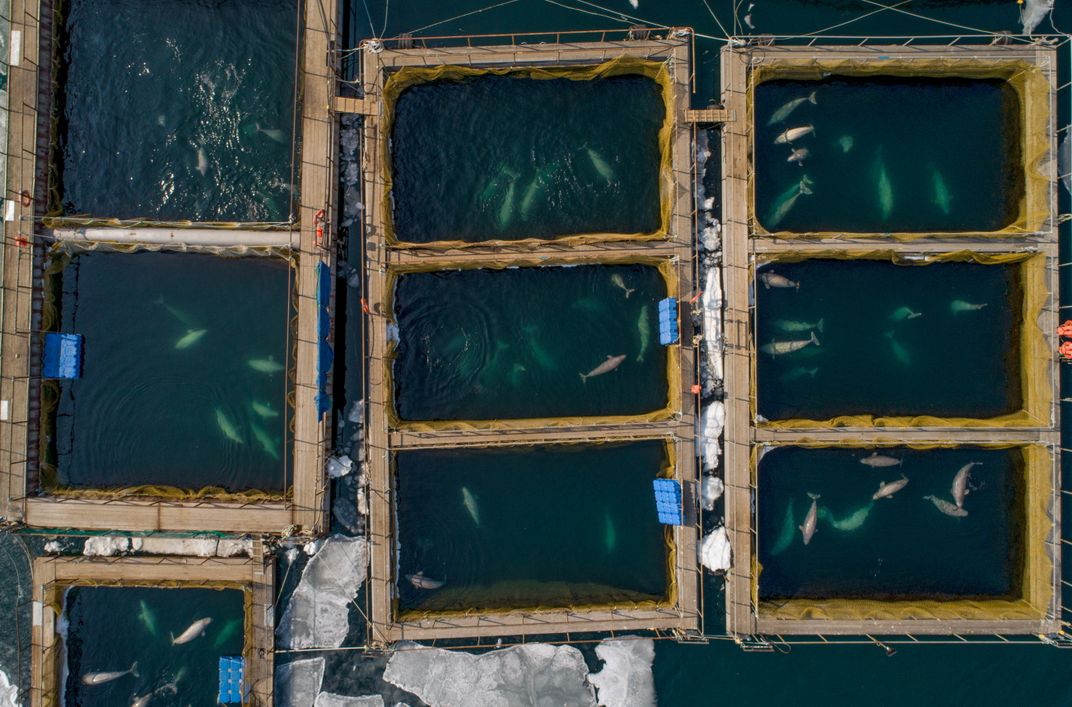Russia Frees Last Belugas From Notorious ‘Whale Jail’
Dozens of orcas and belugas had been kept in small sea pens, reportedly awaiting sale to China
/https://tf-cmsv2-smithsonianmag-media.s3.amazonaws.com/filer/ba/cd/bacd84a9-5807-4a99-a239-4a1899be882c/gettyimages-1128197451.jpg)
In late 2018, disturbing drone footage of dozens of orcas and belugas, packed into small pens in Russia’s far east, came to international attention. The outcry was swift, prompting intervention by Russian President Vladimir Putin. Now, after a months-long release operation, the last cetaceans have been freed from “whale jail,” as the notorious facility was dubbed, according to Agence France-Presse.
The whales—87 belugas and 11 orcas—had been held in Srednyaya Bay, captured by “four private companies linked to one man,” as Ivan Nechepurenko of the New York Times reported in June. Starting in the summer, officials began releasing the animals in batches, with the last of the orcas set free in June. The final 21 belugas were released from two ships on Sunday, according to the AFP.
The whales were reportedly due to be sold to theme parks in China. Though keeping whales and dolphins in captivity at entertainment facilities has fallen out of favor in some parts of the world, the practice continues to thrive in China. According to the Whale Sanctuary Project, around 950 cetaceans are currently on display in the country, many of them imported from Japan and Russia.
After journalists and activists alerted the public to the situation in Srednyaya Bay, Putin directed a special commission to determine what should be done with the animals. Russian scientists and government officials visited the whales to assess their condition—which was not good. “Many of the orcas showed skin damage, presumably from frostbite and contact with the sharp ice that forms in the sea pens, despite the efforts of the staff of the sea pens to keep the pens clear of ice,” the International Marine Mammal Project revealed. Orcas, for example, are not typically exposed to sea ice in their native habitat.

And no cetacean is “used to being held in a 12-by-10-meter [space] with men crashing shovels over their heads,” Dmitry Lisitsyn, head of the Russian NGO Sakhalin Environment Watch, told Natasha Daly and Maria Antonova of National Geographic in April. All of the belugas, among them 15 babies who likely had not been weaned from their mothers’ milk when they were captured, appeared to be in distress, Lisitsyn added.
Yet a report by the Whale Sanctuary Project and Jean-Michel Cousteau of the Ocean Futures Society revealed that the orcas and belugas appeared to be well fed, and they received only minimal training. Therefore, the animals exhibited “no indicators suggesting that they cannot be released into the wild after appropriate short-term medical and behavioral rehabilitation.”
Putin personally monitored the initial phases of the operation to transport the whales out of the pens, Daly reports. And Russian Deputy Prime Minister Alexey Gordeyev promised that the country would tighten a law that allows cetaceans to be held for “scientific and educational purposes”—a loophole that the four companies were exploiting to legally capture the animals for sale to facilities in China. A Russian court ultimately ruled that the companies’ permits to capture the whales were not in fact legal, and all of them were required to pay large fines.
But according to the AFP, activists and scientists have criticized Russian officials for their handling of the rescue mission—particularly, for “keeping the details of the release secret, not taking any observers on the trip and freeing only a small group of animals at a time rather than all of them together, which would boost their survival odds.”
Jean-Michel Cousteau and Charles Vinick of the Whale Sanctuary Project, who worked with the Russian government to assess the whales and formulate a release plan, revealed in a joint statement that the belugas had been released to Uspeniya Bay, near Lazovsky Nature Preserve—which, the activists admitted, “is not ideal for the belugas, since this is not their normal habitat or the area where they were captured.” North Korean fishing ships also prowl the area, putting the whales at risk of poaching.
Cousteau and Vinick called on the Russian government to monitor the whales intensely for six months after their release. The circumstances may not be perfect, they say, but ultimately “[r]eleasing the cetaceans is the best outcome for the welfare of the cetaceans themselves.”